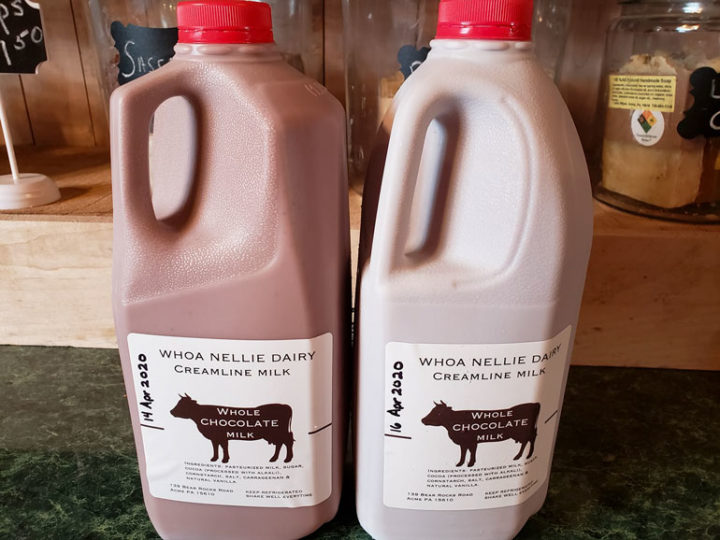On a 500 acre farm operating since the 1700s, people social distancing wait in line to purchase an increasing variety of local products— free range eggs from grain-fed chickens, honey, maple syrup, a variety of cheeses like Fontina, Yellow Cheddar, Mountain Swiss, Gouda, Tuscan, Carolina Gold, beef and pork products (currently sold out), handmade soaps, some Amish products and their 5% Creamline milk, just as it used to be delivered to the doorstep milk-box in the 1950s. It wasn’t always this way, though. While there may be food issues in the wake of COVID-19, the owners of Whoa Nellie Dairy Farm in Acme, Pennsylvania took a stand and changed the paradigm.
Since this pandemic randomly broke the “business-as-usual” model upsetting traditional practices and systems, dumping milk, eggs, produce – perfectly-good food – has been a quick fix solution for a supply-chain meltdown. Buyers unable to sell with adequate profit due to sales’ reduction of cancelled wholesale and retail orders of school, restaurant and event closings told farmers to rid themselves of products that wouldn’t bring profit because they can’t be sold through the traditional supply lines.
As the dairy industry struggles, a PA farm pivots to bottling their own milk to avoid waste.
We vowed “to not dump any of that milk, and we are still marathon bottling around the clock, 24/7, so that none of that milk is wasted,” says Whoa Nellie Dairy Farm’s Mary Beth Brown. pic.twitter.com/vw5Ac9W76T
— CNN Newsroom (@CNNnewsroom) May 8, 2020
“We work around the clock to pasteurize milk, add store hours and sell the milk directly from the farm store,” says Mary Beth Brown, owner of the farm with her husband Ben. “When we were told by Schneider’s (their buyer) that they didn’t have enough market to sell milk, we were told to dump it. We didn’t want to do that,” she continues. By the second week of April, they began full operations to pasteurize, bottle and sell their own milk. After they posted their situation and the availability of their milk products on social media, the word spread. Local and neighboring community members drove and lined Bear Rocks Road to support them. Other local farmers and producers are joining forces to connect directly with the community that supports them. Local solutions to local issues bring people together in learning, sharing and connecting to build engaged communities that can spring back from sudden adversity. It takes vision, unity, passion, hard work, and perseverance.
This is America ! ??Whoa Nellie Dairy Farm, PA decided to bottle their own milk instead of dumping it out . Community responded ??They sold out in matter of hours . PS: They’ve also been supplying milk to ppl in need ! Way to go ! @realDonaldTrump pic.twitter.com/7YXtjIQXIa
— VeBee??✝️ (@VeBo1991) April 30, 2020
Respect for food is a respect for life – for who we are and what we do. (T. Keller) [1] Empowerment builds from thinking and acting locally. Farm-to-table food can be fresher and waste can be lessened since treatment for packaging and transportation is reduced for the usual extended supply chain which is such a part of our marketing system. Fresh local foods seasonally offered bring the product of each unique environment, weather, and land upon which we live and depend. Sustainable agriculture practices can become more frequent as farmers diversify products and crop variety can expand. Power is transferred to the consumer rather than along the extended supply chain and this builds local strength and community.[2]
Within the last few days, the story continues. The Whoa Nellie Dairy Farm social media page states with joy that more farms are accepting their milk products while more producers are bringing their own products to their farm store for sale. As Mary Beth mentions, “The idea for us has always been to be self-sufficient.” This move in uncertain times points to the guiding principles of self-reliance, hard work, and tenacity when few other solutions seemed to exist.
[1] https://saynotofoodwaste.org/interact/food-quotes/#jp-carousel-1666
[2] https://kaynutrition.com/2017/10/the-benefits-of-eating-local-food/










